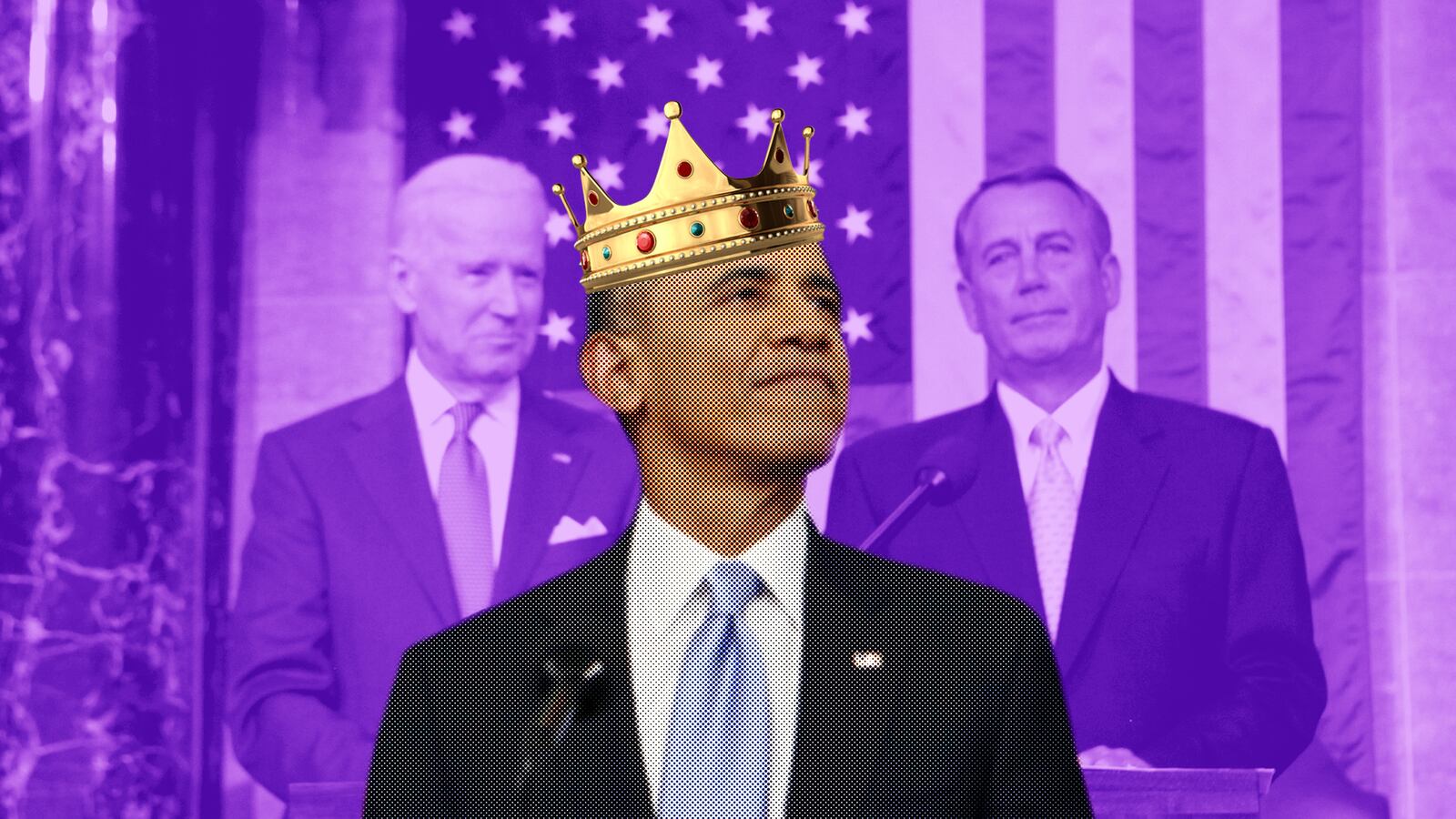Here they come, those accusations. The president thinks he’s a king.
With a stroke of a pen, by signing an executive action on immigration reform, the president has done far more than give millions of immigrants a reason to sleep easier. He has given thousands of constitutional scholars a migraine, and dozens of Republican congressmen an excuse—summed up most succinctly, perhaps, by the obviously pre-scripted (but nonetheless well-delivered) line from Rep. Steve King of Iowa: “I fear what he has done is torn Article One out of the Constitution, put it into his own pocket and said ‘I’m now the legislative branch, too.’”
Tearing up the Constitution? Putting the rest of it in his pocket? Wow, certainly sounds like something a king would do, when he’s not busy slicing it up with Valyrian steel. A crowning achievement, to be sure.
The president himself invited this Game of Comparisons a year ago, when he was asked about executive action on immigration and he reminded the world, “The problem is that I’m the president of the United States. I’m not the emperor of the United States.” Hear that, Dreamers? Pushing through immigration reform is something he simply cannot do.
Until he did. Yesterday.
Hypocrisy? Maybe.
As someone who has torn up the Constitution—literarily if not literally speaking—I can only offer this to anyone who may be sick to your stomach over the prospect that the president who is definitely not an emperor is acting defiantly like a king: a little history to help get over those monarch butterflies.
Simply this: We’ve been here before. Democrats, including then-Sen. Barack Obama, made the accusation against President Bush during the Iraq War. The Copperheads, a group of Midwestern Democrats, made the accusation—and far worse—against President Lincoln during Emancipation. Nixon was accused. Truman. I’m surprised no one has accused Bill Cosby of tearing up the Fourth Amendment back when he was on I Spy.
At worst, President Obama’s move is just latest sequel: Executive Action Part 2: There’s Some King About Barry.
Even the guys who wrote the Constitution, and compromised on what it said regarding the Executive—yet still signed the darn thing—accused each other of violating its separation of powers even before there were a separation of powers to violate.
In fact, so difficult was the question about the design of the presidency that when delegate James Wilson rose in Independence Hall in 1787, turned the convention’s attention to the executive branch—the elephant in the room—and offered a straightforward proposal—“the Executive [shall] consist of a single person”—it left the delegates dumbstruck. According to James Madison, there was “a considerable pause.” Benjamin Franklin warned against making any hasty conclusions on such “a point of great importance.”
Why the pause? The Framers had two people—and two kinds of people—in mind at every step: George Washington, the president of the Convention who harbored “no ambition to govern men”; and John Adams, the “hermaphroditical character” whom Washington himself thought suffered from “monarchical principles.” Washington’s role model was Cincinnatus, the reluctant savior of Rome who turned his back on power. For his ambition to govern men, Adams’ role model may well have been Gollum—my precious, my precious presidency… Had he his way, Adams wanted the president to be called “His Highness, the President of the United States of America, and Protector of Rights of Same,” a superlatively ridiculous idea that Thomas Jefferson denounced as “superlatively ridiculous.” It’s too bad for President Adams that President Washington insisted on, simply, “Mr. President.”
History recalls that George Washington became the first president of the nation and is remembered as “the most balanced of men,” whereas John Adams first became vice president—a gig he considered “the most insignificant office that ever the invention of man contrived”—and is remembered as “the guy portrayed by Paul Giamatti who played Pig Vomit in that Howard Stern biopic.” And I mean no disrespect to Paul Giamatti. Baba-booey.
Then there was Alexander Hamilton, who, in a six-hour rant, insisted that “The British government… is the best in the world,” and on the subject of the Executive in particular, declared that “The English model… was the only good one on the subject.” Long Live the King.
So heated was the debate over the executive branch—to king or not to king—that when delegate Rufus King (what is it with guys named King having a problem with kings?) sarcastically suggested that presidents serve a term of 20 years—since “this is the medium life of princes”—it fell to James Madison to point out that his suggestion “might possibly be meant as a caricature of the previous motions in order to defeat the subject of them.” In other words, King was being a royal smart-ass. Baba-booey.
The men of 1787 were conflicted. But both parties in 2014, if they’re being honest, would assent to the notion that there have been good executive actions. We’ve benefitted from times that presidents have said, “King Me.” The Emancipation Proclamation, as Nancy Pelosi reminds us, was an executive action. If not for Jefferson’s Louisiana Purchase, we’d be crowning thy good with brotherhood “from sea to shining St. Louis,” even though Jefferson himself admitted that “in seizing the fugitive occurrence which so much advances the good of the country,” he had “done an act beyond the Constitution.” It’s something he simply could not do. Until he did.
Technically speaking, when President Obama reminded us all that he’s “not the emperor of the United States,” he said only that being president is “the problem.” He said nothing about whether being president also offers a solution. (And not for nothing, he made that president/emperor distinction on a Google Hangout. He may have felt the need to reduce the issue’s complexity, Schoolhouse Rock-style. …I’m just a president, yes I’m only a president, sitting here on Pennsylvania Avenue, talking to my computer…Can you hear me now?)
What he might have said: Thanks to the Framers, we have inaugurations, not coronations. The stroke of a pen is not the wave of a scepter. And the Constitution, written on goatskin not rice paper, might be as our country was under Jefferson. It might withstand some stretching.






